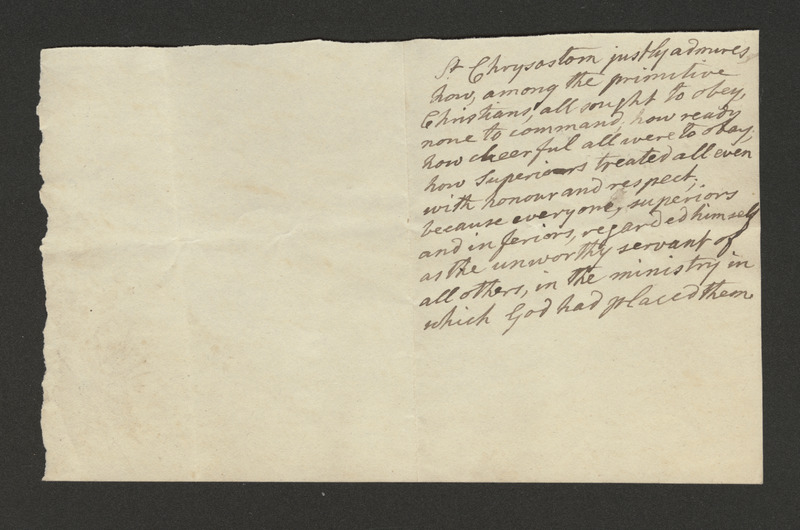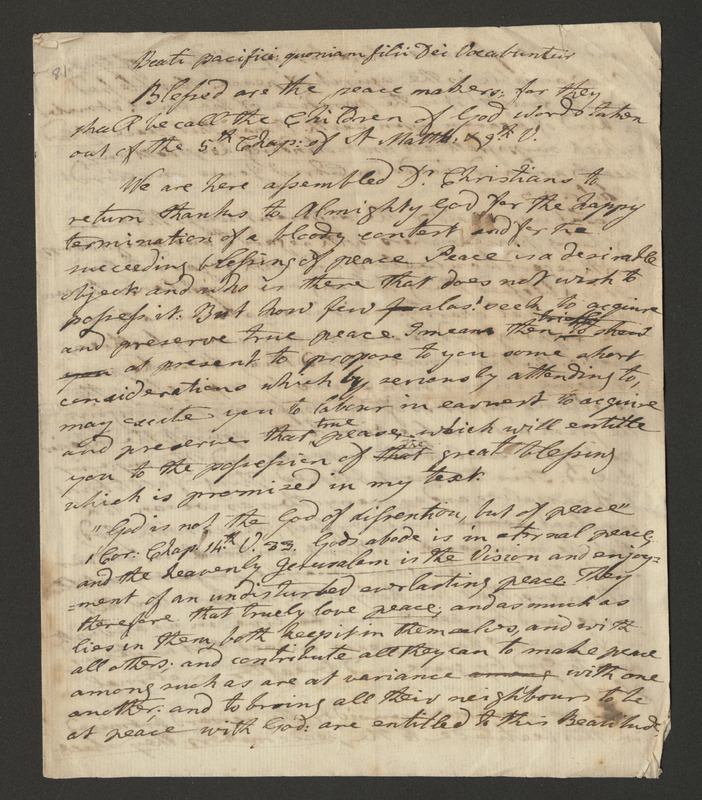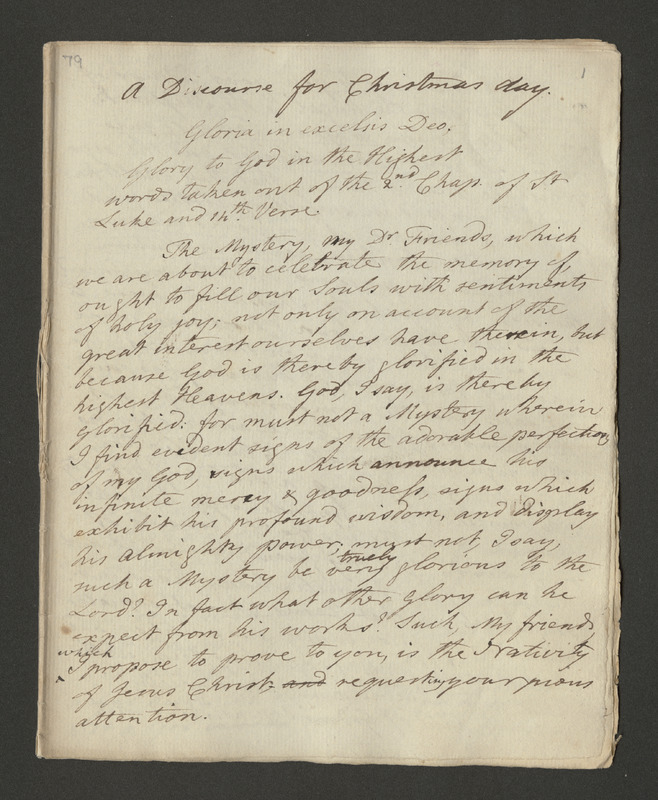James Archer sermons
The collection consists of 82 sermons written for Sundays, religious holidays, and as inducements into the religious profession. Only one sermon is dated (1788) although the watermarks on the paper run as late as 1826. The sermons are of varying length but generally run about 12 pages long. For a list of titles of the sermons see the following container list. The text of the sermons contain many corrections and revisions and appear to be intended for delivery rather than for publication although two, item 66 and item 70 in the container list appear exactly as printed in Archers published work Sermons on various Moral and Religious Subjects for All the Sundays and some of the Principal Festivals of the Year, London, 1817. The sermons reveal to the scholar the style and content of a popular English Catholic priest during the period of Roman Catholic persecution in England. Lacking dates the collection remains in the same order in which it was received. The scholar will have to decide if the order is significant.
-
 Text
TextUntitled; no verse. Concerning the loyalty of Catholics to their country
Archer, James, 1751-1834This brief piece calls attention to the words of St. Chrysostom, who admired those Christians who faithfully and honorably served where God had placed them -
 Text
TextUntitled; no verse. Concerning the loyalty of Catholics to their country
Archer, James, 1751-1834This brief piece reminds Christians to be grateful for the victories God has given them over the enemies of their countries. -
 Text
TextUntitled; Hebrews 9:27
Archer, James, 1751-1834This sermon cautions against waiting too long to turn to God, warning that there is no chance to have such a change of faith on your deathbed, rather that a life of dedication is the only way to find salvation after death. -
 Text
TextUntitled; Matthew 5:9
Archer, James, 1751-1834This sermon focuses on God as a bringer of peace, emphasizing that the Kingdom of God is one of eternal peace and that those who seek to create and bring peace to the world are the true Children of God. -
 Text
TextSermon for the 7th Sunday after Pentecost; Matthew 7:19
Archer, James, 1751-1834This sermon reminds Christians that to earn God's mercy and find salvation after death, you must actively seek out penance and work towards a life without sin. -
 Text
TextA Discourse for Christmas Day; Luke 2:14
Archer, James, 1751-1834This sermon explores the ways in which Jesus Christ exemplifies behaviors of humility and compassion as a reflection of the Glory of God. -
 Text
TextUntitled; Matthew 17:2
Archer, James, 1751-1834This sermon explores the meaning of transformation through the lens of the Resurrection of Jesus Christ, reminding Christians that a Jesus was transformed after death, they must work to transform their hearts through seeking to be virtuous in their actions. -
 Text
TextUntitled; Matthew 4:1-2
Archer, James, 1751-1834This sermon addresses the ways in which Jesus Christ acts as an example of the strength and fortitude needed to resist temptation and fight against the work of the Devil. -
 Text
TextDiscourse for the first Sunday after Pentecost; Luke 6:37
Archer, James, 1751-1834This sermon cautions against rash judgement and condemnation of others as it is in direct conflict with the virtues of Charity and love which all Christians should practice. -
 Text
TextDiscourse for a Religious Profession; Job 14:15
Archer, James, 1751-1834This sermon celebrates the call to religious service, or vocation, as a gift from God and a responsibility of faith. -
 Text
TextA Naviate in Domini; Luke 2:10
Archer, James, 1751-1834This sermon reflects on God's love through the lens of Jesus' birth. -
 Text
TextA Discourse for Christmas Day; Luke 2:14
Archer, James, 1751-1834This sermon discusses the change brought to the world by the arrival of Jesus Christ on Earth. -
 Text
TextA Clothing Discourse; Luke 9:23
Archer, James, 1751-1834This sermon addresses the importance of self-denial for women seeking a religious profession, emphasizing that self-denial prevents one from falling victim to religious enemies, and explaining that entering into a religious life is the best form of religious penance. -
 Text
TextA Discourse on the Passion of our Lord J.C.; no verse
Archer, James, 1751-1834This sermon cautions against questioning the decisions of God based on the limited knowledge and reason of humanity, specifically in regards to the Passion and Crucifixion of Jesus Christ. -
 Text
TextSermon for the 1st Sunday of Advent, "On the General Judgement
Archer, James, 1751-1834This sermon cautions against growing complacent in the face of the fear invoked by considering the day of Final Judgement and encourages Christians to keep in mind the eventual day that their immortal souls will stand before God for Judgement. -
 Text
TextA Clothing Discourse; no verse [Revised]
Archer, James, 1751-1834This sermon celebrates the transition of a group of women to join a religious order and take up the habit, outlining the virtues of such a choice and the level of dedication to Christ that is needed to undertake such a spiritual journey. -
 Text
TextFor a Religious Profession; Deuteronomy 26:7
Archer, James, 1751-1834This sermon examines the importance of choosing God as a Christian and the meaning behind being given that choice. -
 Text
TextA Sermon for the 2nd Sunday of Lent; Thessalonians 4:2
Archer, James, 1751-1834This sermon explores the concept of love and forgiveness for all mankind as taught by Jesus Christ and conveyed by the apostle Paul. -
 Text
Text16th Sunday after Pentecost, "On Good Example;" Luke 14:1
Archer, James, 1751-1834This sermon explores Jesus Christ in his role as a teacher through acting as an example, demonstrating the virtues that Christians should strive to emulate. -
 Text
TextA Discourse for the 16th Sunday after Pentecost; Luke 14:3
Archer, James, 1751-1834This sermon outlines and explains the commandment of God in regards to proper observance of the Sabbath (Sundays) and other designated holy days. -
 Text
TextA Sermon for the 20th Sunday after Pentecost; John 4:46
Archer, James, 1751-1834This sermon considers the dynamics of a Christian family, including the proper relationship dynamics between parents and their children, as well as godparents and their godchildren.